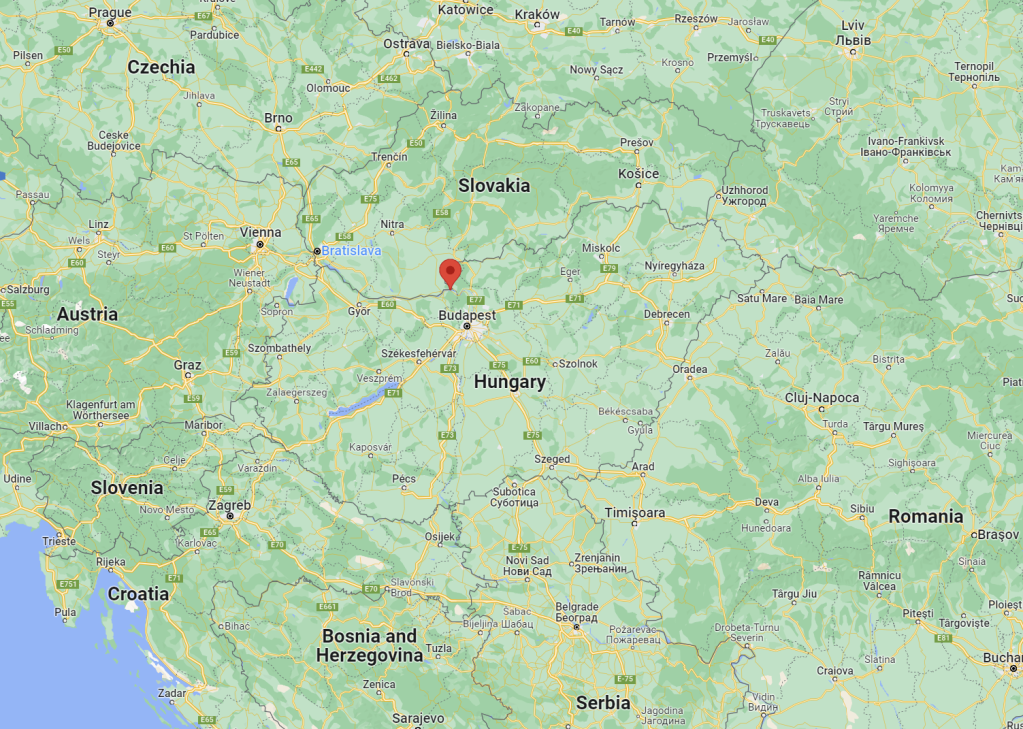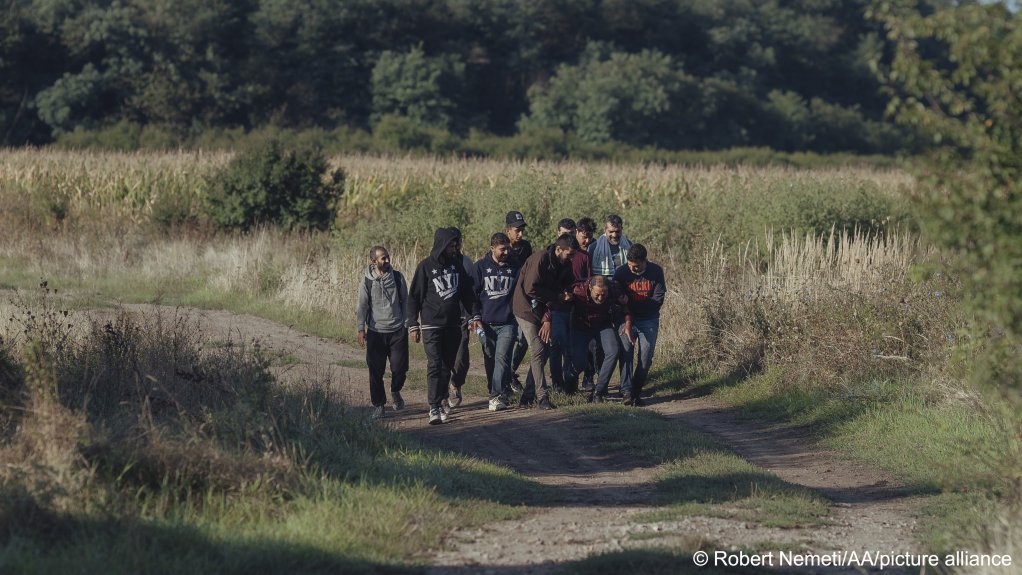Increase in migration polarizes Slovakia ahead of elections - InfoMigrants
As more migrants on their way to Germany enter Slovakia from Hungary without authorization, Slovak authorities have increased border police patrols, among other measures. Populist former Prime Minister Robert Fico, the frontrunner in the upcoming parliamentary election, seeks to tap into public concerns about irregular migration.
Residents of the border village of Chl'aba say large groups of migrants have been arriving at their municipality in southern Slovakia every day in the past few weeks after wading through a local river or crossing a railway bridge from neighboring Hungary.
According to the residents, the migrants mostly come at night but don't stay long as their final destination is usually Germany. Still, their presence has caused concerns and calls for tighter border controls in Slovakia as it prepares for parliamentary elections due on Saturday (September 30).
"They don't want to live or work here, they are in transit, they rush through as they can," 70-year-old Jozsef Barta told news agency Reuters.
While admitting he knew of no criminal action committed by migrants, he added: "People are scared to walk in the street."
It's mostly rural communities like Chl'aba in the south of the country that have noticed the increase in the number of migrants, many of whom sleep rough in parks and other public facilities.
Renata Gregusova, manager of a grocery store popular among migrants, said the migrants usually ask locals to call the police and sit down until the police van picks them up and takes them to a detention center. Once arrived, they can get their entry to the European Union registered.
"Somehow this [flow] should be limited ... They should be checked to find out whether they were really forced to flee their country," Gregusova told Reuters.
Majority wants stricter migration rules
The election is being held early after Slovakia's center-right coalition collapsed and a caretaker government with Prime Minister Ludovit Odor at the helm took over in May. A rise in migrants crossing into Slovakia after traveling across neighboring Hungary as well as the war in neighboring Ukraine have polarized the country of 5.5 million in the run-up to the vote.
Against this backdrop, Odor sent up to 500 soldiers to the border with Hungary earlier this month to assist border police patrol the border and maintain order.
The government also agreed to help those communities by sending buses to take migrants to other places in the country in a bid to alleviate the burden on police departments there. It has also pledged to improve services for refugees and migrants like food supplies and hygiene facilities.
 Slovakia with the border village of Chl'aba (red marker) as well as surrounding countries | Source: Google Maps
Slovakia with the border village of Chl'aba (red marker) as well as surrounding countries | Source: Google Maps
Last weekend, Odor visited the border crossing at Chl'aba, located some 40 kilometers north of the Hungarian capital Budapest. Chl'aba reportedly has the second highest migrant detention rate with around 2,000 this year.
The number of migrants who have been detained in Slovakia has increased ninefold to more than 27,000 so far this year compared to a year ago, according to the country's interior ministry.
According to Reuters, the caretaker prime minister said police were trying to increase a sense of security in the local villages. At the same time, the government maintains it is virtually impossible to seal the 655-kilometer border with Hungary.
Nonetheless, Odor's course of action in the migration debate doesn't seem broadly popular: Roughly three out of four Slovaks want the next government to tighten rules against irregular migration, a poll by the AKO agency from earlier this month found.
Slovakia, a 'worthwhile' diversion for migrants?
Slovakia's left-wing SMER opposition party led by former prime minister Robert Fico recently urged Slovakia's caretaker government to suspend Europe's Schengen 'open border' rules and reinstate passport checks on the Hungarian border to halt the increasing numbers of migrants crossing from Hungary to Western Europe, Reuters reported.
At a news conference on Tuesday (September 19), Fico claimed the government lets in every migrant who arrives in Slovakia irregularly.
"We know nothing about them, they have no documents, they make up names, dates of birth, but the government allows them to stay here," said Fico, whose party has been campaigning on an anti-immigrant, anti-American and pro-Russian platform.
Despite dozens of senior officials, police officers, judges, prosecutors, politicians and business people convicted of corruption and other crimes being linked to SMER, opinion polls indicate that Fico's party currently has a roughly 3% lead on its main rival, the liberal Progresivne Slovensko (Progressive Slovakia). However, Reuters reported that no party is expected to win an overall parliamentary majority.
According to Reuters, there appears to be a link between an increase in activity on the so-called Balkan route into western Europe and the Slovak law that allows Syrians and Afghans -- deemed to be refugees fleeing war -- to register.
This makes it reportedly much harder to deport them from the EU; as a result, they then typically leave their detention centers and continue westwards via Slovakia and the Czech Republic to Germany.
According to Marian Cehelnik, an NGO worker who deals with migration, this "makes it worthwhile for migrants to divert from their standard route and make a stop in Slovakia," despite it being "an administrative issue" for Slovak authorities.
Also read: EU asylum reform ignores volatility of escape routes, experts say
No effective deterrent in sight
Both Slovakia and Hungary, its neighbor to the south, are seen as transit countries for migrants and refugees who hope to reach more affluent parts of Europe.
Most migrants who come through Slovakia are young men from the Middle East and Afghanistan and mostly get there via the so-called Balkan route: They enter Hungary from Serbia despite a steel fence that Hungarian Prime Minister Viktor Orban had built after the 2015 migration crisis that saw more than one million people lodging asylum requests in 2015/16 in Germany alone.
 Migrants cross the Slovakia-Hungarian border near Vyskovce Nad Iplom, Slovakia on September 6, 2023 | Photo: Robert Nemeti/Anadolu/picture-alliance
Migrants cross the Slovakia-Hungarian border near Vyskovce Nad Iplom, Slovakia on September 6, 2023 | Photo: Robert Nemeti/Anadolu/picture-alliance
According to the UN refugee agency UNHCR, close to 15,000 migrants and refugees are estimated to have transited through the Western Balkans between January and July 2023.
Hungarian police data also showed a jump in unauthorized border crossings on Hungary's southern border with Serbia in the past weeks, from where they head for Slovakia or Austria.
"Despite Hungary's efforts, there are migrants who evade border defense and cross Hungary's territory on their way to other countries of Europe," Reuters cited a spokesperson for the Hungarian government.
Among Hungary's methods to prevent migrants from entering via non-EU country Serbia are pushbacks -- an illegal practice Hungary has been extensively criticized for. According to Reuters, however, many migrants make it through the fence with the help of smuggling gangs who then bring them across Hungary to the border with Slovakia.
Neither Slovak police patrols helping their Hungarian colleagues to catch the smugglers, nor the Czech Republic -- an EU member state like Slovakia -- reinforcing its 250-kilometer border with Slovakia a year ago with additional security checks has proven an effective deterrent.
Orban's government, citing overcrowded prisons and a lack of financial help from the EU, has released more than 1,500 foreign nationals convicted of people smuggling since April.
Read more: The EU's migration dilemma: Is sealing borders the solution?
This piece is partly based on a Reuters feature